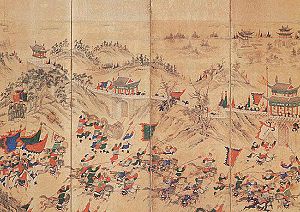Siege of Pyongyang (1593)
| Siege of Pyongyang | |||||||
|---|---|---|---|---|---|---|---|
| Part of the Japanese invasions of Korea (1592-1598) | |||||||
 Chinese cavalry and infantry attacking the walls of Pyongyang in 1593, from a Chinese painted screen in the Hizen-Nagoya castle museum |
|||||||
|
|||||||
| Belligerents | |||||||
| Japanese army | Ming Dynasty allies | ||||||
| Commanders and leaders | |||||||
| Konishi Yukinaga |
Korea Li Rusong Yang Hao Li Rubai Song Yingchang Wu Weizhong Zu Chengxun |
||||||
| Strength | |||||||
| About 18,000 |
Korea Ming |
||||||
| Casualties and losses | |||||||
| 1,560 |
Korea 796 killed |
||||||
Korea
Kim Myeong-won
Kim Eun-seong
Yu Seong-ryong
Yi Si-eon
Yujeong
Hyujeong
Korea
8,000 soldiers 2,000 warrior monks
Ming
Korea
at least 240 killed
The Siege of Pyongyang was a battle fought between the Ming-Korea alliance and Japanese forces during Japanese invasions of Korea. On December 25, 1592, the Ming army assembled by the administrator Song Yingchang and led by the general Li Rusong crossed the Yalu river and after a number of small engagements with the Japanese, they met with Joseon forces and together marched towards PyongYang. According to the letters of Song Yingchang (經略復國要編; Jīng lüè fù guó yào biān) the Ming forces that crossed at the time were roughly 36,000 in strength. The two sides combined for a little over 40,000.
The Japanese forces were led by Konishi Yukinaga and the entire army of the first division. They were roughly 18,000 in strength, and had spent the past few months setting up defenses within the area. However the Japanese forces at the time were stretched thin and their supply lines were overexposed to the numerous insurgents in Korea, a problem made more complicated by the exploit of Yi Sunshin and his navy. Pyongyang was at the very front of their deployment and was in dire supply situation.
The allied forces arrived at Pyongyang on 5 January 1593, at the west end of the Pyongyang.
The Ming had previously sent their diplomat Shen Weijing to start negotiations with the Japanese in the previous months, and he was present in the army as well. He was sent forth again when the army reached the walls to make attempts at parley. Konishi Yukinaga, realizing their own trouble with logistics, was therefore also agreeable to Li's offer for talks.
...
Wikipedia
